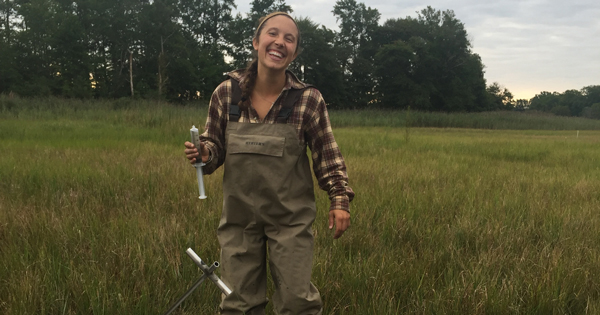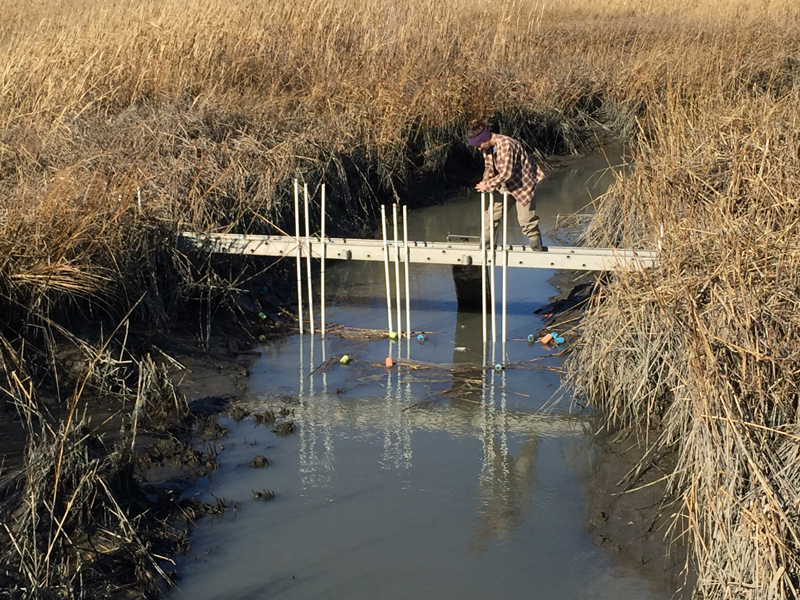


UD student uses Delaware Sea Grant fellowship to study coastal marshes
Photo by Coty Cribb October 14, 2017
Applications for the 2018 Healthy Coastal Ecosystems Fellowship accepted through Nov. 6
Coastal marshes play an important role in filtering nutrients and pollutants from water. They slow water movement, too, which can reduce damage and protect communities from severe storms, while also supporting vegetation and marine organism growth, and creating recreational opportunities for people.
Julia Guimond, a doctoral student in the Department of Geological Sciences, spent the last year conducting field research at the St. Jones Natural Estuarine Research Reserve, a brackish estuarine system located on the St Jones River in Dover, Del., to explore how water movement through the marsh affects the marsh chemistry.
Guimond’s work, funded through a fellowship provided by Delaware Sea Grant (DESG) and the Delaware National Estuarine Research Reserve (DNERR), is focused on how water movement interacts with the biology and chemistry of the marsh and how those interactions relate to the amount and makeup of the water that is transported to the coastal ocean.
“Salt marshes are valuable for their ability to sequester, or store, carbon dioxide from the atmosphere,” Guimond said. “Understanding how this stored carbon is affected by the physical movement of water during tidal cycles is important to predicting how these conditions might change with sea level rise and increased precipitation,” says Guimond.

Since January, Guimond has been collecting water samples from across the marsh, as well as data about the saltiness of the water and the temperature and depth in different vegetation zones. She also monitors water quality parameters that help determine what chemical reactions may be happening in the water. Monthly checks on how fast the water is moving through the marsh helps her to understand what seasonal changes or locational changes might be at work.
“One of the amazing things about marshes is that under the right conditions, they can vertically accrete — or grow — against sea level rise,” Guimond said. “Marshes are highly connected systems, so how sea level rise affects the hydrology of the marsh is connected to the chemistry below the water’s surface, which connects to the vegetation.”
As the tidal cycle brings water in and out through channels connected to the ocean, water and nutrients are transported, or exchanged, between the marsh and the tidal channels. What and how much is exchanged depends on water movement and can have an impact on the amount of carbon stored in the system. Yet despite their importance, the relationship between this water movement and the carbon dynamics at work in estuarine marshes is relatively understudied.
Guimond will spend the winter getting a handle on the data and using it to form a predictive model to understand how the St. Jones DNERR marsh might change under different climate conditions. Quantifying the role of marshes in sequestering carbon and the potential for the release of carbon with storm surges, climate change and sea level rise could help advance stewardship and ecological preservation efforts.
“We are already beginning to see connections between the water movement, or what’s happening physically, and the chemistry data,” said Guimond, adding that she’s thankful for the DESG/DNERR funding that gave her a running head start on her doctoral research with coastal hydrogeologist Holly Michael, Unidel Fraser Russell Chair for the Environment.
“The fellowship has definitely opened doors, allowed me to be creative and to try something new that I might not have been able to do otherwise,” Guimond said. “It’s an awesome opportunity to gain experience writing a proposal and learning to plan and execute a budget, things all graduate students should learn.”
2018 proposals now being accepted
Delaware Sea Grant is currently accepting proposals for the 2018 Healthy Coastal Ecosystems Fellowship.
The deadline to apply is Nov. 6. For complete application materials, visit the DESG website.
Offered in partnership with DNERR, the fellowship provides up to one year of support for two graduate students to advance understanding of what makes coastal ecosystems sustainable and resilient to past, present and/or future pressures.
The fellowship includes $10,000 in funding and at least a portion of the proposed research must be conducted within at least one of the DNERR’s two “living laboratories” in the Delaware bayshore region: the St. Jones Reserve, a brackish estuarine system located on the St. Jones River in Dover, and Blackbird Creek Reserve, a tidal freshwater estuarine system located in Townsend.
About Delaware National Estuarine Research Reserve
The Delaware National Estuarine Research Reserve (DNERR) serves to protect and manage the natural resources within the Reserve as a place for research, and for providing education and outreach programs that promote better understanding of Delaware’s estuarine and coastal areas, and to promote informed coastal decision-making.
About Delaware Sea Grant
The University of Delaware was designated as the nation’s ninth Sea Grant College in 1976 to promote the wise use, conservation and management of marine and coastal resources through high-quality research, education and outreach activities that serve the public and the environment.
UD’s College of Earth, Ocean, and Environment administers the program, which conducts research in priority areas ranging from aquaculture to coastal hazards. Delaware Sea Grant is one of 33 Sea Grant programs nationwide.
Contact Us
Have a UDaily story idea?
Contact us at ocm@udel.edu
Members of the press
Contact us at 302-831-NEWS or visit the Media Relations website

